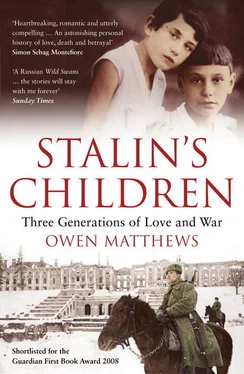It was Xenia who pulled me out of it. She drove a reluctant Robert and me to a church near my apartment, where we both lit candles for the dead men. But more importantly, she helped me by making a home, a real family home, the first I had had since leaving London seven years before. I left my bachelor apartment and rented a dacha deep in the Moscow woods near Zvenigorod, not far from Xenia’s parents’ at Nikolina Gora. We painted the rooms bright colours. I bought Dagestani kilims and old furniture, and we dismantled the old Russian stove in the living room and used the heavy old tiles to build an open fireplace where the stove had stood. Xenia replaced the brass knobs on the grate we had bought with two small clay heads she had sculpted. One was a portrait of me, the other of her, and our little clay images faced each other across the hearth.
Better by far you forget, and smile,
Than that you should remember, and be sad.
Christina Rossetti
Mila and Mervyn arrived at Heathrow in a grey London drizzle. They took the bus to Victoria; a taxi would have been too expensive. As they drove down the Westway London struck Mila, she told me, as being ‘very poor, very down-at-heel’. When she saw old women in woollen coats and headscarves she told her new husband that they were ‘just the same as our Russian babushkas’.
Mervyn’s little one-bedroom flat on Belgrave Road in Pimlico was an ascetic place, with a tatty carpet and barely warmed by large brown electric storage heaters, set low to save money. My mother remembers that Mervyn’s single bed was just two foot six inches wide, and covered with thin army surplus blankets. When the newly freed Gerald Brooke called round to ask if there was anything Mila needed, the first thing she thought of was proper woollen blankets. After the overheated apartments of Moscow, Mila found the flat desperately cold. In order to warm up she would go out for brisk walks through the streets of Pimlico. Her abiding memory of that first winter in London was ‘the terrible damp chill which penetrated your bones – much worse than the Russian winter’.
My parents went for walks in St James’s Park, and visited the House of Lords for tea with Lord Brockway, one of the dignitaries whom Mervyn had persuaded to help his campaign. A friend of Mervyn’s took Mila to Harrods, but she was unimpressed. Western plenty didn’t amaze her as it did some Soviet visitors. ‘We had all this in Russia – before the Revolution,’ she joked as she was reverently led into the Food Halls. Mervyn drove her to Swansea, stopping off at Oxford on the way, and introduced Mila to his mother. For all her entreaties to Mervyn to give up his struggle over the years, Lillian embraced Mila warmly.
My mother immediately set to work making my father’s flat as cosy as possible, setting out the old china she’d brought from Russia and putting her books on the shelves. She made a great effort to become the perfect wife of her imagination, preparing dinners from her well-thumbed copy of 1000 Tasty Recipes, the Soviet housewives’ culinary Bible. She tried to make friends with the neighbours, but most of them snubbed her and wouldn’t even greet her in the hallway – whether out of British coldness or because Mila was a citizen of an enemy empire, she never worked out. Often in her first six months, the shock of dislocation would overwhelm her and she would burst into tears. She wept from the cold as she typed translations to earn a bit of money, her tears falling among the typewriter keys. Mervyn was at a loss as to how to comfort her. He chose to let her cry herself out.
‘I can’t say I was completely unhappy,’ my mother recalled. ‘But I think I had spent too much of my life in Moscow for leaving not to be a terrible trauma.’
She missed her friends, and the passion and excitement of the dissident lifestyle – swapping samizdat books, waiting for the next issue of the Novy Mir journal (which had even dared to publish Solzhenitsyn’s One Day in the Life of Ivan Denisovich in 1962), being part of a devoted group of like-minded people who had become like a family to her. And though she had never been rich, even the small luxuries of Soviet life had always been affordable. But in London, Mervyn’s salary barely covered his own needs, let alone Mila’s. She remembers standing weeping outside a Tube station after she’d spent all her money on little presents for her Moscow friends at a haberdasher’s on Warren Street and didn’t have enough left over for the fare. In a fit of generosity, my father took her to Woolworth’s and bought her a green wool dress for a pound. It was the only item of clothing she bought all ofher first year.
For the first time in her life, Mila felt depressed, unable to summon the unconquerable will which had fuelled her fights ever since her childhood illness. She wrote to her sister in Moscow of her terrible homesickness. My mother didn’t say openly that she wanted to return, but Lenina feared that was only because her headstrong sister couldn’t bear to admit to herself that all her years of struggle had been a mistake. Lenina showed the letter to Sasha, who sat down at the kitchen table to compose a reply. ‘Dearest Mila, there is no way back for you,’ he wrote. ‘You have chosen your fate and you must live with it. Love Mervyn; have children.’
After so much expectation, so much idealization, so much sacrifice and burning, high ideals, could the reality have been anything but a disappointment? What marriage, what life in the fairyland of the West could ever live up to the expectations of six years of longing? I believe that to my parents, the fight had become an end in itself sooner than either of them realized. When victory came neither of them knew how to continue the story. For years Mervyn and Mila had been superhuman creatures to each other, bounding over mountains and valleys, beating on the doors of heaven, confronting the juggernaut of history. But when they finally came together as real, living people, they found themselves having to invent something neither of them had ever known – a happy family. After a life as actors in a great drama they found the hardest thing was simply to become human again.
In the spring of 1970, as she was returning from Brighton on the train after a session teaching Russian, Lyudmila had one of her attacks of melancholy and burst into tears. Unlike in Russia, no fellow passenger came to comfort her or to ask what the matter was. But she looked up out of the window at the green English fields. ‘What a fool I am,’ my mother remembers thinking. ‘I have been crying for six months. This Russian blackness must stop.’ Slowly, Mila began to make a life for herself in London. My father was always shy of company and never had many close friends, but my gregarious mother soon made English friends who loved her warmth and wit, and with whom she could go to the theatre and ballet. They never became the close-knit, comradely surrogate family of my mother’s youthful circle, but being among cultured people helped ease the pain of losing her old Moscow life.
My mother took on more translation work and part-time teaching at Sussex University. An organization called Overseas Publications offered her a job editing samizdat literature in Russian, which offered the opportunity to continue her old dissident enthusiasms. She edited Let History Judge, a meticulous indictment of Stalinism by the dissident historian Roy Medvedev, as well as many other books published by Overseas Publications, copies of which were sent into the Soviet Union via parcel post by a network of Russian émigrés across Europe. Surprisingly, almost all the books would get through, to be avidly circulated and copied in typescript by Mila’s friends in Moscow. The organization’s director told Mila that it was funded by a wealthy American industrialist; in reality it was covered by the CIA’s covert anti-Soviet activities budget, as was Radio Liberty, where my mother also got work as an editor. Radio Liberty even offered her a presenting role, but she refused in case it damaged her chances of one day revisiting her homeland.
Читать дальше











